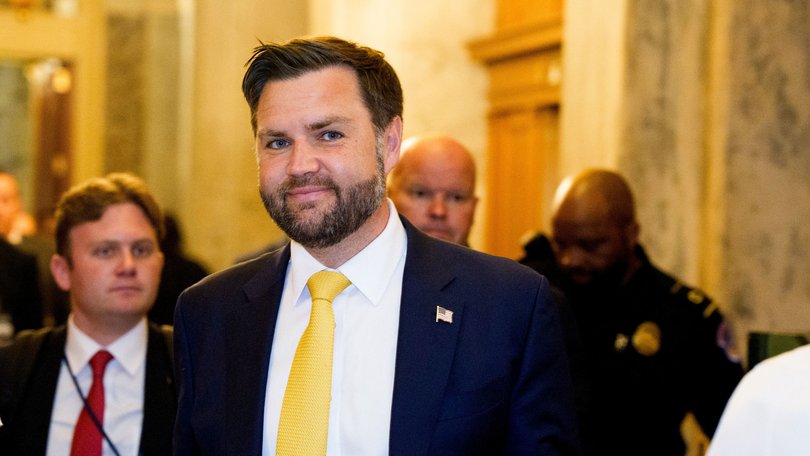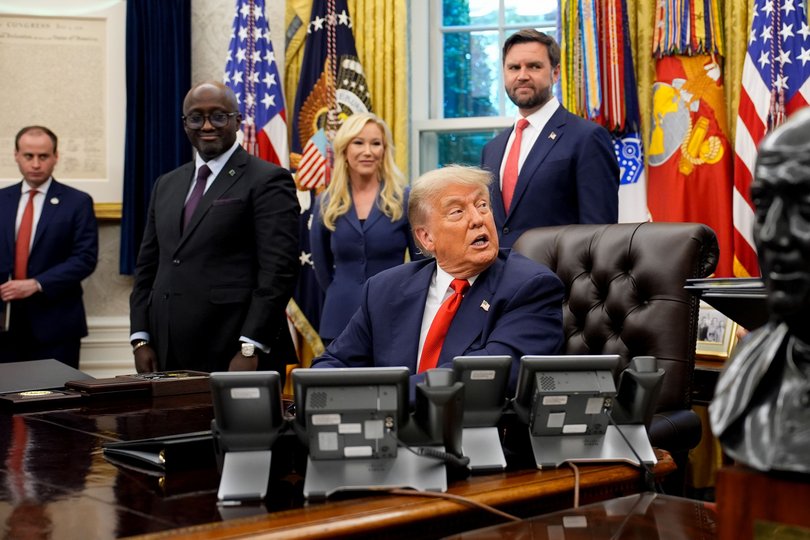Unpopular Donald Trump tax plan becomes focal point for Democrats’ House comeback
The Democrats have pledged to use the controversial piece of legislation to try to win back the House of Representatives, while the Vice President says the measures will be a ‘big win for the American People’.

Democrats are planning to make President Donald Trump’s massive tax and spending package central to their efforts to retake the House in next year’s midterm elections, arguing that its deep cuts to Medicaid and food assistance puts them at a distinct advantage over Republicans trying to sell the bill’s tax and immigration provisions to voters.
Polls show a wide swath of Americans do not know many details about what’s in the mammoth legislation, which narrowly passed the Senate on Tuesday and has been sent back to the House for final passage.
Both Republicans and Democrats said that lack of knowledge gives them an opportunity to define the legislation to voters who will decide control of the House in the 2026 midterm elections, and both parties said the law will be central to their campaigns over the next 16 months.
Sign up to The Nightly's newsletters.
Get the first look at the digital newspaper, curated daily stories and breaking headlines delivered to your inbox.
By continuing you agree to our Terms and Privacy Policy.Many Republicans - who hold a razor-thin majority in the House - acknowledge that they face an uphill battle in selling the bill to a wary public, particularly because of party infighting as lawmakers have raced to pass the bill by Mr Trump’s self-imposed Fourth of July deadline.
And polls show that those who do know about the legislation strongly disapprove - a Washington Post-Ipsos poll conducted last month showed Americans oppose it 2 to 1, with other polls showing similar margins.
The legislation, known as the One Big Beautiful Bill, would extend trillions of dollars in tax cuts from Mr Trump’s first term and implement new campaign promises - such as eliminating income taxes on tips and overtime wages - while spending hundreds of billions of dollars on immigration enforcement and defence.
To offset the cost, the legislation would cut about US$1 trillion from Medicaid, the government health insurance program for the poor, along with additional cuts to Medicare and the Affordable Care Act. Taken together, Republican changes to Medicaid, the ACA and other programs would result in at least 17 million people losing health insurance, according to the nonpartisan Congressional Budget Office.

The bill also would make drastic cuts to SNAP, the anti-hunger Supplemental Nutrition Assistance Program, formerly known as food stamps.
Democrats, who uniformly oppose the legislation, said their message is simple: Republicans are offering tax breaks to billionaires on the backs of working-class Americans.
“Children will be hurt. Families will be hurt. Women will be hurt. Seniors will be hurt. Everyday Americans with disabilities will be hurt,” House Minority Leader Hakeem Jeffries (D-New York) said.
“Hospitals will close, nursing homes will shut down, and community-based health clinics will be unable to provide services.”
Republicans said that while voters disapprove of the bill as a whole, individual provisions within it are more popular, such as extending tax cuts, removing taxes on tips and increased funding for border security. They said they will have to defend against Democratic attacks regarding Medicaid cuts by arguing that the cuts will ensure that the program is available for the most vulnerable and will eliminate waste, fraud and abuse.
“Public polling shows this bill is still largely undefined in the minds of voters, which means the fight to define it is just beginning,” said Mike Marinella, national spokesman for the National Republican Congressional Committee. “This bill delivers historic tax relief, secures the border, restores integrity to welfare programs and cuts government waste. This vote will cement the Democrat Party’s image as out of touch with hardworking Americans, and House Republicans will be relentless in making this the defining issue of 2026.”
But Republicans have been less cohesive in their message, particularly as several prominent senators - including Sens. Susan Collins (R-Maine), Lisa Murkowski (R-Alaska), Josh Hawley (R-Missouri), Jim Justice (R-West Virginia) and Thom Tillis (R-North Carolina) - expressed deep concern about the bill’s Medicaid cuts and the impact that they would have on already struggling rural hospitals in their states.
Ahead of the Senate vote Tuesday, Vice President JD Vance wrote on X: “Everything else - the CBO score, the proper baseline, the minutiae of the Medicaid policy - is immaterial compared to the ICE money and immigration enforcement provisions.”
After the legislation passed the Senate, Vance wrote: “Massive tax cuts, especially no tax on tips and overtime. And most importantly, big money for border security. This is a big win for the American people.”
Tillis opposed the legislation and then announced that he would not seek reelection, warning of the bill’s dire consequences for North Carolina. Democrats face a difficult Senate map overall in 2026 but believe North Carolina has become well within reach with news of Tillis’s retirement.
A group of House moderates - all of whom voted in support of the House version that passed in May - also wrote a letter to GOP leaders last week warning that they could not support a final bill that “threatens access to coverage or jeopardises the stability of our hospitals and providers.”
The Senate version of the bill ended up including even deeper cuts to Medicaid and a limit on what is known as the provider tax for hospitals, which rural providers have warned would threaten their ability to stay open or offer critical services to vulnerable residents. The House moderates urged leaders not to adopt the steeper cuts in the Senate bill.
Murkowski voted in support of the package but said afterward that she did not like the bill or the rushed process it went through. The final version was loaded with benefits for Alaska.
“Do I like this bill? No,” Murkowski said. “I tried to take care of Alaska’s interest but I know that in many parts of the country, there are Americans that are not going to be advantaged by this bill. I don’t like that.” She later wrote on X that she hoped the Senate version “is not the final product” and said that it “is not ready for the President’s desk.”
Democrats said many of Republicans’ own statements will feature prominently in their ads and on the campaign trail as they seek to define the bill to voters.
“We’re just going to try to get the message out to the country about what’s in this monstrosity of a bill, and we could do no better than to quote the Republicans who’ve said they’d rather leave politics than to have anything to do with it,” said Rep. Jamie Raskin (D-Maryland). “People like Thom Tillis from North Carolina, Don Bacon from Nebraska, or even Elon Musk, who says it’s an absolute monstrosity and he’ll start a new political party if they really go forward with this.”
On Tuesday, the Democratic Congressional Campaign Committee released a memo attacking “so-called moderates” in the House who supported the legislation.
“Republicans will lose the majority in 2026 and the Big, Ugly Bill will be the reason why,” the memo stated. “From now until November 2026, the DCCC will continue to communicate the harm this bill will cause, uplift the stories of the everyday Americans negatively impacted, and mobilize voters … to hold vulnerable Republicans accountable for abandoning their central promise to voters.”
Republicans have tried to deflect criticism of the Medicaid cuts by arguing that many of the people who will lose health insurance are undocumented immigrants. “Not importing millions of illegal immigrants and giving them benefits is the only way to save the country - and its finances. That policy is far more important than any other provision of this bill,” Vance wrote on X on Tuesday.
But health policy experts said that argument is a red herring because undocumented immigrants are not eligible for federally funded health programs, including Medicaid. Instead, a program called Emergency Medicaid - which accounted for 0.4 percent of total Medicaid spending in 2023, according to KFF, a health policy research organisation - reimburses hospitals for emergency care that they are required by law to provide to people who may be undocumented or are present in the country legally but do not qualify for Medicaid. Some states use state-only funds to help cover some undocumented immigrants.
“The bottom line is undocumented immigrants are not eligible for Medicaid,” said Joan Alker, executive director of Georgetown University’s Centre for Children and Families. “This is their bait and switch.”
